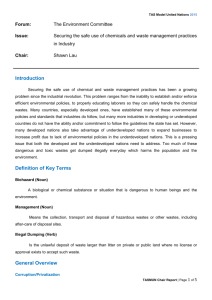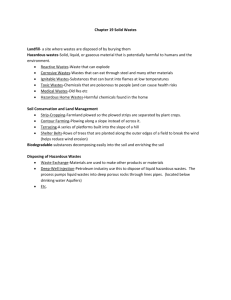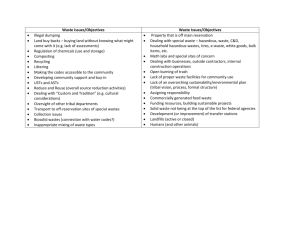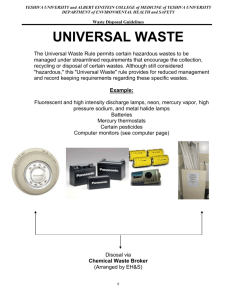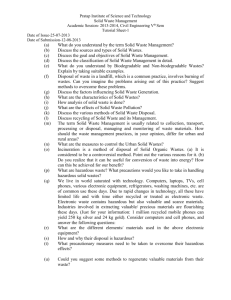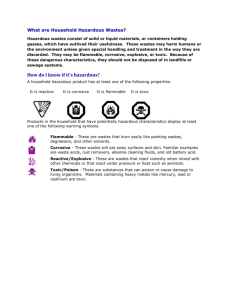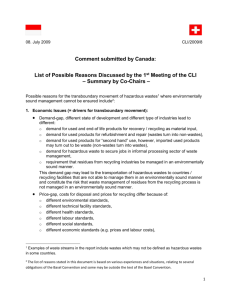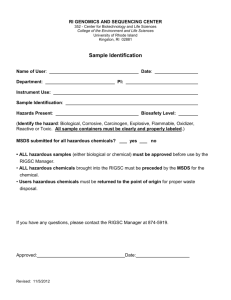English Only
advertisement
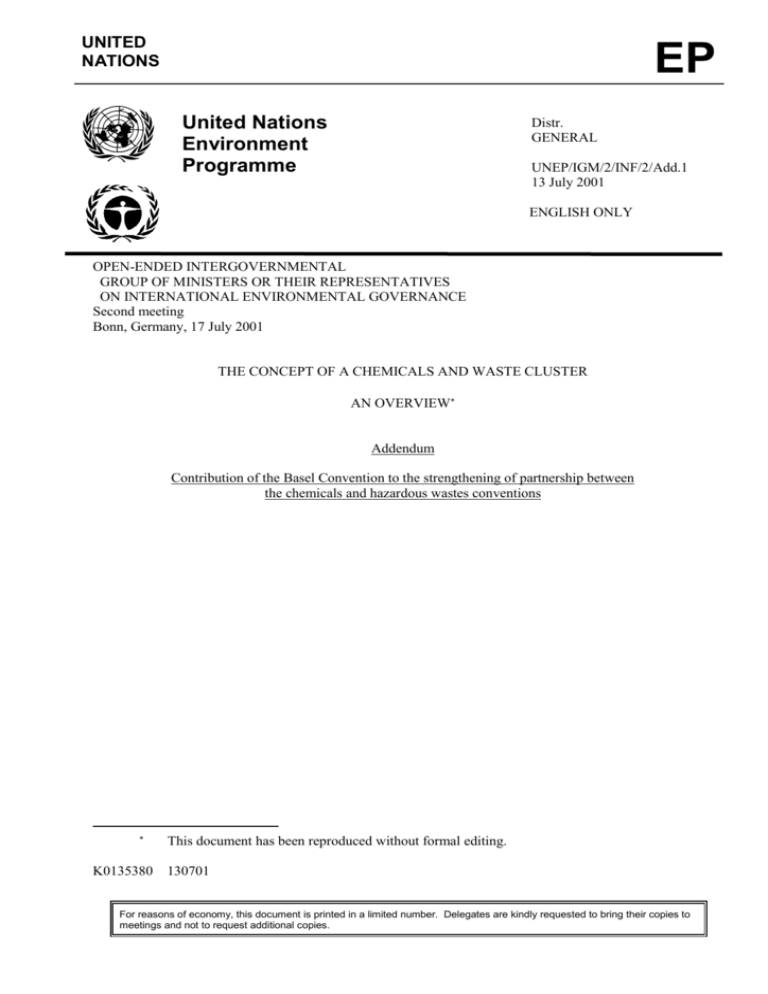
UNITED NATIONS EP United Nations Environment Programme Distr. GENERAL UNEP/IGM/2/INF/2/Add.1 13 July 2001 ENGLISH ONLY OPEN-ENDED INTERGOVERNMENTAL GROUP OF MINISTERS OR THEIR REPRESENTATIVES ON INTERNATIONAL ENVIRONMENTAL GOVERNANCE Second meeting Bonn, Germany, 17 July 2001 THE CONCEPT OF A CHEMICALS AND WASTE CLUSTER AN OVERVIEW Addendum Contribution of the Basel Convention to the strengthening of partnership between the chemicals and hazardous wastes conventions K0135380 This document has been reproduced without formal editing. 130701 For reasons of economy, this document is printed in a limited number. Delegates are kindly requested to bring their copies to meetings and not to request additional copies. UNEP/IGM/2/INF/2/Add.1 CONTRIBUTION OF THE BASEL CONVENTION TO THE STRENGTHENING OF PARTNERSHIP BETWEEN THE CHEMICALS AND HAZARDOUS WASTES CONVENTIONS Purpose 1. This note attempts to provide factual elements regarding the contribution of the Basel Convention to the strengthening of partnership between the chemicals and hazardous wastes conventions or protocols, taking into account the general trend in the shift of national policy focus from treatment and disposal of hazardous and other wastes to the integrated life-cycle management approach. This shift of focus requires the consolidation and further development of partnership with other chemicals – or waste-related multilateral environmental agreements (MEAs) to achieve the goals enshrined in Agenda 21. Basel Convention in brief 2. The Basel Convention with its Amendment and Protocol is the global instrument for the environmentally sound control of hazardous waste and their disposal, and the mechanism for the prevention and monitoring of illegal traffic in hazardous wastes. The Convention provides for general obligations for Parties To reduce transboundary movements of hazardous wastes and minimize their generation To manage hazardous wastes in an environmentally sound manner To build up international cooperation to fulfil their obligations under the Convention. In 1999, the Conference of the Parties adopted the Basel Ministerial Declaration on Environmentally Sound Management calling for immediate attention to the enhancement and strengthening of efforts and cooperation with the aim of making environmentally sound management of hazardous and other wastes accessible to all Parties, emphasizing the minimization of such wastes and the strengthening of capacity building Strengthening capacity-building for implementation – a collaborative approach 3. There is a pressing need and demand for strengthening national capacity for the effective implementation of the Basel Convention, for building an integrated approach to the implementation of the Basel Convention and the Stockholm and Rotterdam Conventions, and for the prevention and monitoring of illegal traffic in materials covered by these three legal instruments. Regional mechanisms are being promoted to strengthen and further develop the capacities of Parties to effectively implement MEAs. Initiatives are being taken to have the Basel Convention Regional Centres becoming the main regional vehicles for assisting in the implementation of the Basel Convention and other related global and regional chemicals and wastes conventions or protocols. Developing partnership further 4. Recognising the importance of building partnership among all stakeholders, the fifth meeting of the Conference of the Parties adopted in December 1999 a number of decisions on cooperation, in particular with other MEAs. As requested by the Conference of the Parties, the Secretariat of the Basel Convention is actively involved in building partnership with other key chemicals - and wastes related - conventions or protocols, noting scientific inter-linkages, common environmental issues and cumulative knowledge or experience in domains of relevance to these MEAs. Clear programmatic links exist regarding the destruction and disposal of POPs as wastes, on the disposal of ozone-depleting substances, on the management of toxic chemicals in trade and regarding obsolete stocks of hazardous wastes (pesticides, PCBs and used oils). The adoption of the Stockholm Convention on POPs in May 2001 has created a new and important window of opportunities for building sustainable cooperation between this Convention and the Basel Convention. It is opportune to move from ad-hoc cooperation to the development of integrated and comprehensive programmes on POPs as wastes, in particular regarding PCBs and obsolete stocks of pesticides. Discussion is ongoing with UNEP Chemicals on this matter. 2 UNEP/IGM/2/INF/2/Add.1 5.There is at the same time a need for the further development of partnership between the Basel Convention and intergovernmental organisations and programmes to address the wide spectrum of environmental challenges. Cooperation with ILO on occupational health and safety issues related to the dismantling of ships or with WHO on health risks represent priority areas of cooperation. 6. The elements that are further developed as an Annex to the present note are aimed at exemplifying the ongoing as well as future prospective partnership between the Basel Convention and other chemicals - and wastes-related international agreements. It also provides the framework under which such partnership is being conceived and operationalized. It should be emphasized that strengthening of partnership between the chemicals and hazardous wastes conventions or protocols requires the effective involvement of a large number of United Nations bodies and specialized agencies, regional systems and organizations as well as, in addition to MEAs, of a wide spectrum of multilateral agreements concerning or related to transport, occupational health and safety, enforcement, liability and compensation or chemical weapons. 3 UNEP/IGM/2/INF/2/Add.1 CONTRIBUTION OF THE BASEL CONVENTION TO STRENGTHENING PARTNERSHIP BETWEEN THE CHEMICALS AND HAZARDOUS WASTES CONVENTIONS ANNEX GOAL: OVERALL FRAMEWORK: LEGISLATIVE FRAMEWORK: To protect human health and the environment from the adverse effects of toxic chemicals and hazardous wastes The integrated environmentally sound life-cycle management of materials MAIN PARTNERS OF THE SECRETARIAT OF THE BASEL CONVENTION 4 Decisions of the Conference of the Parties regarding cooperation with UNEP on POPs , with the Rotterdam Convention on PIC, with the UN bodies, specialized agencies, regional systems/organizations and others; with the Montreal Protocol; the London Convention 1972 and its 1996 Protocol; with WCO and OECD; Work programme of the Technical Working Group as adopted by the fifth meeting of the Conference of the Parties in December 1999: Technical guidelines on the environmentally sound management of POPs as wastes; cooperation with the UNEP Chemicals and relevant organizations on the newly adopted Stockholm Convention on POPs; on the Rotterdam Convention on PIC; on the issue of the stockpiles of hazardous wastes. The Basel Ministerial Declaration on Environmentally Sound Management adopted in December 1999. UNEP Chemicals and FAO regarding the mutually supportive arrangements for the effective implementation of the Basel, Stockholm and Rotterdam Conventions. FAO, UNEP, WHO, UNIDO, World Bank, GEF, OAU, UNECA, African Development Bank, environmental and development NGOs and industry for the cleaning up of stocks of obsolete pesticides in Africa and implementation of preventive measures to avoid further accumulation of these materials. IOMC Coordinating Group on obsolete stocks of pesticides UNEP Secretariat of the Montreal Protocol on cooperation between the two secretariats and between the Technology and Economic Assessment Panel of the Montreal Protocol and the Technical Working Group of the Basel Convention regarding the disposal of controlled substances under the Montreal Protocol and its Amendments. IMO - In the areas of prevention of dumping or incineration of hazardous wastes at sea (London Convention 1972 and its 1996 Protocol); management of ship generated wastes (MARPOL); the dismantling of ships; the transport of dangerous goods and wastes by sea (International Maritime Dangerous Goods Code); and on liability and compensation (International Convention on Liability and Compensation for Damage in connection with the Carriage of Hazardous and Noxious Substances by Sea). IAEA on the Joint Convention on the Safety of Spent Fuel Management and on the Safety of Radioactive Waste Management (adopted in 1997); UNEP/IGM/2/INF/2/Add.1 World Customs Organisation on relationship between the Harmonized Commodity Description and Coding Systems and the lists of wastes contained in the Basel Convention for the purpose of clearly identifying hazardous wastes in the Harmonised System; OECD on harmonization of OECD Council Act on transfrontier movements of wastes destined for recovery with the Basel Convention control system; Bamako (Africa), Waigani (Pacific) Conventions, Central American Agreement and Regional Seas Conventions, Protocols and Action Plans CITES regarding enforcement and training of customs officers United Nations Committee on the Transport of Dangerous Goods and on the Global Harmonized System on Classification and Labelling of Chemicals Organization for the Prohibition of Chemical Weapons (OPCW). Exchange of information and joint training activities regarding the destruction and environmentally sound disposal of chemical weapons. ILO regarding occupational health and safety and WHO on health risk ----- 5
